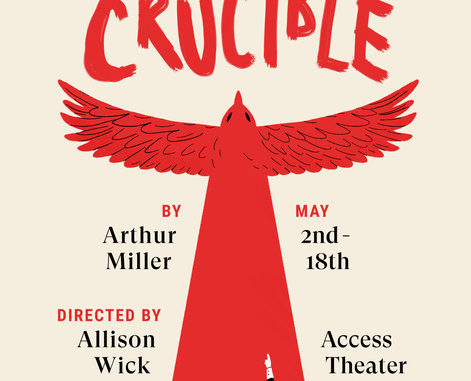

Review Fix chats with Allison Wick of Hunger Theatre, who lets us know why their Ensemble’s version of the Arthur Miller classic is worth revisiting.
About The Production:
The Crucible is a 1953 play by legendary American playwright Arthur Miller. It is a dramatized (and partially fictionalized) story of the Salem witch trials of 1692-93. Miller wrote the play as an allegory for McCarthyism – the anti-communist witch hunt against trade unionists, artists, and leftist activists which was in full swing at time of his writing the play.
Hunger Theatre’s mission: “To produce great plays, new and old, with simplicity, playfulness, and daring. To conduct emotional electricity. To serve the human truth of each story above all else.” Co-founded by Ms. Wick and Luke Wehner, alumni of Circle in the Square Theatre School and students of prominent acting coach, Ken Schatz, Hunger Theatre began in 2016 with a series of new one-act plays and later, a showcase production of Mark Schultz’ Everything Will Be Different. Show-Score gave this production a plethora of accolades, including “First off, the entire cast deserves a standing ovation for their performance. Allison Wick (Charlotte) laid it all on the stage and it was magnificent. Ms. Wick handles the emotional weight brilliantly.” “The lead actress is so brilliant that it’s worth seeing just for that… The story is powerful, well written and leaves you truly impacted. This is the kind of theater that makes me love living in New York.”
Review Fix: What was the inspiration/reasons for doing this play?
Allison Wick: First and foremost, it’s simply a play that I love. It’s incredibly moving – you just can’t argue with Miller’s writing here – and of course it has enduring significance. As we’ve been preparing to put this up, many people have remarked to me that they feel it to be particularly relevant in the current political climate, and indeed, it’s worth noting that Donald Trump was mentored by Joe McCarthy’s righthand man, Roy Cohn. There’s no doubt about it that we live in a very sick society, and the flagrant attacks on democratic rights that we see more and more each day are evidence of that. Is it surprising that we are still facing these issues today, 66 years after Arthur Miller wrote this play? Personally, I don’t think so. The driving forces behind both the McCarthyite persecutions and our current crisis are far bigger than a particular administration or party – they go to the very roots of the political and economic system in this country. The play deals with these questions very powerfully, and so I think it will resonate with our audiences.
Review Fix: What’s your creative process like?
Wick: As a director, I try to approach things simply. I believe that most of what you need to tell a story effectively is given to you by the playwright, and so we start by asking basic, important questions like “what is the story that this play/moment/line tells?†and “what does the audience need from the actors to get that story?†We are very much an actor-focused company – to me, good acting is always more important than clever directorial concepts, and I really love digging into that aspect of the work.
Review Fix: What makes this different or special from previous productions?
Wick: Ours will be a stripped-down production, cast non-traditionally, with an ensemble of fifteen actors playing over twenty characters. We have a remarkably talented cast, and I’m excited about the opportunity this affords us to approach the text in fun and dynamic ways.
Review Fix: What are your ultimate goals for this production?
Wick: Although the production will be somewhat unconventional, my ultimate goal is not to “reinvent†the play but to reveal the heart of it. There’s a kind of theatrical magic that can come from simplicity and emotional truth, and that’s what I’m really after. Arthur Miller remarked that it wasn’t the original Broadway production, directed by the great Jed Harris, that made the Crucible a critical success – it was “a gang of young actors, setting up chairs in the ballroom of the McAlpin Hotel [who] fired up the audience, convinced the critics, and the play at last took off and soon found its place.†It’s in this spirit that we’re approaching the play, and I hope to give our audiences something that they will find riveting and compelling, not just a buttoned-up, heavy-handed rehashing of a classic.
Review Fix: What’s next?
Wick: There are a few pieces we have our eyes on producing in coming seasons, including a play by Chekhov and another by Camus. I’ll have to leave you in suspense about the details for now, but you can follow us on social media @hungertheatre, or join our mailing list at hungertheatre.com for updates.


Leave a Reply